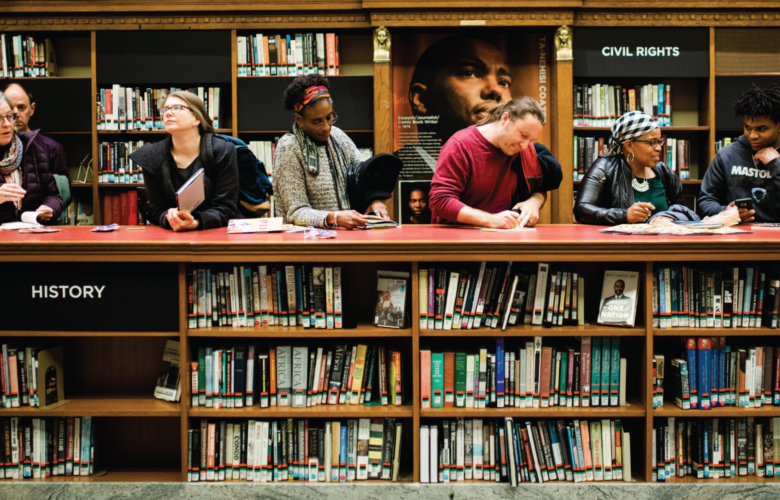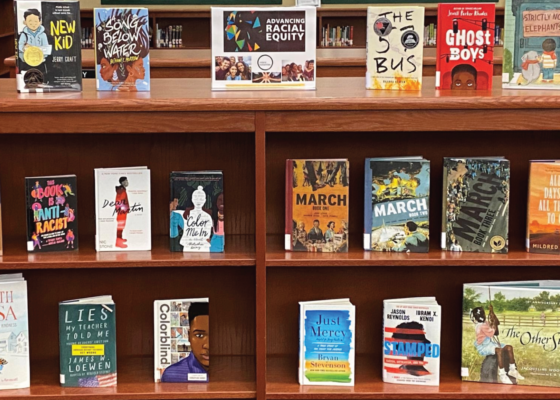Call for Speakers: Advancing Racial Equity
January 1, 2023Indiana Humanities seeks proposals from humanities scholars and experts for talks and presentations on the history of race, the Black experience in Indiana and racial equity. Why are we creating…
Indiana Humanities seeks proposals from humanities scholars and experts for talks and presentations on the history of race, the Black experience in Indiana and racial equity.
Why are we creating a Speakers Bureau?
Indiana Humanities’ ongoing Advancing Racial Equity program, funded by Lilly Endowment Inc., provides support to libraries, schools and other organizations that circulate books, films, and resources to public audiences, helping to make materials on the subject of anti-Black racism and racial equity more accessible. As this program expands, we look to provide these organizations with access to experts and program support to encourage humanities-based conversations about the history of race and racism, the Black experience in Indiana and efforts toward racial equity.
We work with scholars and experts to shape and lead our programs. Humanities scholars bring deep expertise and provide valuable context, and they’re often skilled at sharing information and unlocking conversation around a big idea or shared text. Further, scholars are good at helping people become comfortable with tension and gray area, with the idea that answers are rarely “yes” or “no” but often more complex than we ever realized. Skilled humanists ask thoughtful questions, model patient consideration of multiple points of view and get others excited to talk about ideas.
We also know that, increasingly, scholars are passionate about connecting their research to the public. A speakers bureau helps facilitate these connections and furthers our mission to help Hoosiers think, read and talk.
What types of talks are we looking for?
We’ve identified some key themes for our own programming and are especially interested in proposals that can help Hoosiers engage with these ideas, though we’re open to a wide range of topics in the humanities. While we’re interested in helping Hoosiers learn more about the history and culture of Indiana specifically, we’ll also consider broader topics addressing the experiences of Black Americans throughout our nation’s history.
- History of race and racism—Related topics: Histories and legacies of slavery; Black settlements in Indiana; the Klan and anti-Black sentiment; Indiana and the Civil Rights movement; public policies (e.g., education, workforce, housing, etc.) and political movements; community building and organizing; specific moments or events that reveal the dynamics of race relations in Indiana and beyond.
- Historical interpretation and memory—Related topics: Monuments; perspectives on preservation or interpretation at historic sites or of events; community and family histories, traditions and memories; oral histories and archives.
- The Black experience—Related topics: Black art, literature and culture in Indiana and beyond; notable Black Hoosiers or Hoosier communities; stories and storytelling.
- Conversations about racial equity and anti-racism—Related topics: Racial justice and injustice; how to discuss race and racial inequity; humanities perspectives on building just, equitable communities.
We welcome proposals for talks by scholars working across disciplines and invite interdisciplinary perspectives. Each talk should be about 40 minutes long plus time from questions or discussion with the audience (about an hour total). Presentations can be geared toward adult, teen or youth audiences. And we’re open to proposals that take the standard scholar talk and flip it on its head (e.g., creative writing or performance workshops, text-centered conversations or whatever else you can imagine). As long as your proposal aligns to our goal of engaging Hoosiers in understanding and discussing the historic contexts for contemporary debates around race and racism, we welcome all formats for the program.
The ideal scholar-facilitator:
- Shares Indiana Humanities’ vision for open-ended, inclusive and thoughtful discussion about meaningful topics.
- Is enthusiastic about sharing the insights of the humanities with Hoosiers.
- Is passionate about Indiana and its future and sees how the humanities can make a difference in our state.
- Is not afraid to tackle difficult topics and help communities ask hard questions.
- Is open to learning new techniques and best practices for giving talks and leading public humanities programs.
- Has advanced training, such as an M.A. or Ph.D., in a humanities or humanistic social science discipline or other related field. Alternatively, has extensive experience, expertise or cultural knowledge in a topic related to the topics listed above.
- Responds to email communication in a timely manner.
- Is willing to travel statewide (as public health conditions allow) and provide their own transportation.
What makes a great talk?
- A compelling idea: Great talks are interesting and are usually built around one focused idea. However they start—with a question, claim or observation of a problem—they should leave the audience with the excitement of encountering a new idea.
- Dynamic, easy speaking style: Some speakers are funny, some are serious, but great public speakers are often able to adjust their tone and formality depending on the audience. Given that these talks are for general public audiences, they avoid diving too deeply into the jargon of their field, and they find ways to relate to or hold the attention of a crowd.
- Deep expertise: The speaker knows their stuff! Usually this is demonstrated by advanced study such as an M.A. or Ph.D. in a humanities field such as literature, history, philosophy, history of science, art or theater history, etc. Additionally, elders and culture-bearers have knowledge gathered through personal experience, community and/or ancestors.
- Relevance: The speaker makes the case for how their specific topic is a lens for thinking about the larger historical context, a broader philosophical question, a contemporary debate or phenomenon, etc. The speaker has spent time thinking about how to make their talk relevant to nonspecialist, general-public audiences, often by creating connections with people’s everyday lives.
How does the speakers bureau work?
After selecting speakers for the bureau, Indiana Humanities publishes a catalog of presenters and talks. Libraries, schools, churches, civic organizations and other tax-exempt organizations may then review the offerings and apply to host a speaker through Indiana Humanities. If we select an organization as a host, we connect it to the requested speaker, and the two parties make arrangements for the talk. Upon completion of the talk, Indiana Humanities pays the speaker a $400 honorarium and the host site agrees to reimburses travel expenses.
Anyone may contact a speaker directly to plan a program, and speakers may accept and negotiate additional engagements on their own. However, Indiana Humanities will pay honoraria only for talks that we award through our application process.
To apply:
To submit a proposal for the speakers bureau, email or call Megan Telligman (see below) for more information or complete an online form. As part of the application, we’ll ask you to submit a presentation description, a biography and a CV/resumé.
A committee of Indiana Humanities staff, board members and subject area experts will review the proposals. We may ask candidates to provide additional information via email or a quick call in order to make final decisions.
Interested in applying?
Contact Megan Telligman (Director of Programs, Indiana Humanities) at mtelligman@indianahumanities.org / 219.405.4544. Indiana Humanities will accept new speakers bureau proposals through Mar. 31, 2023.



